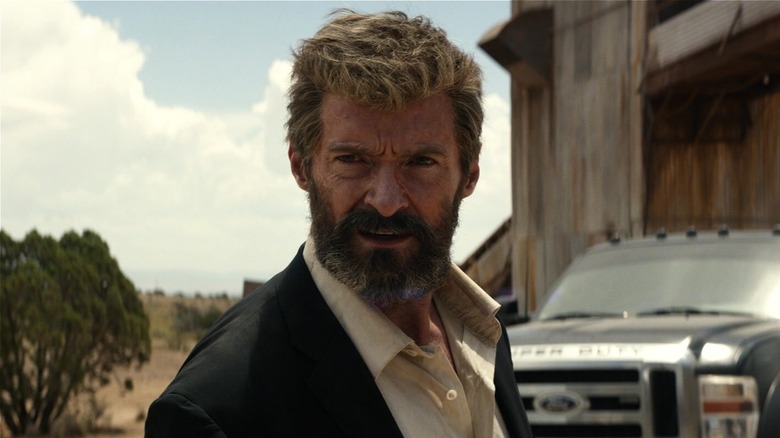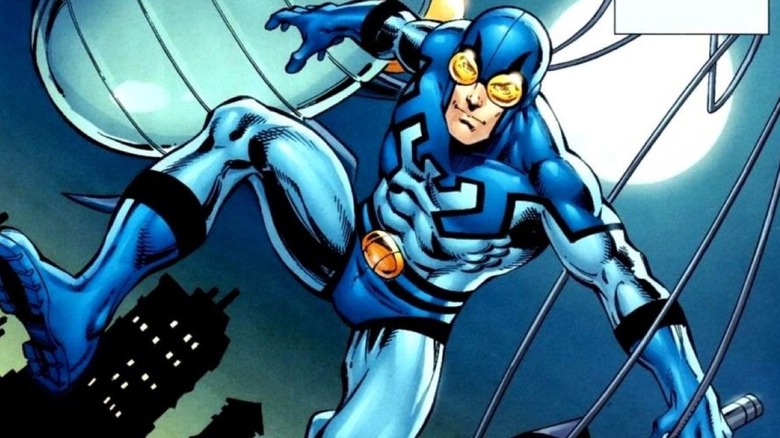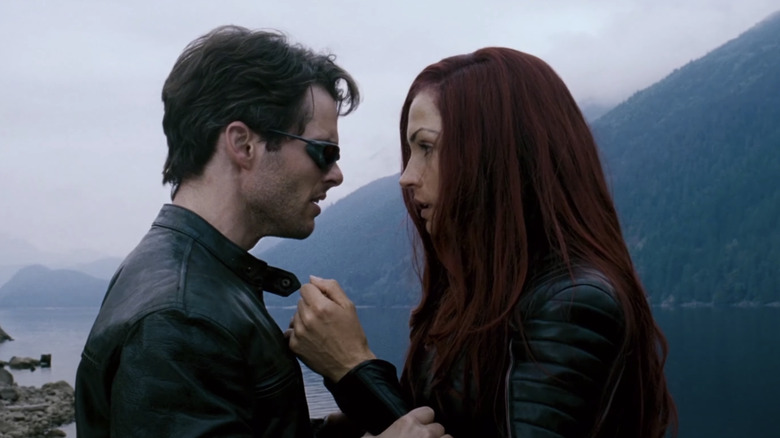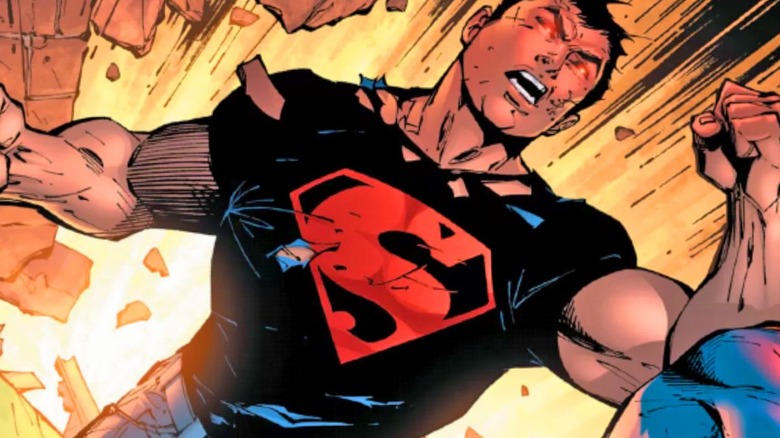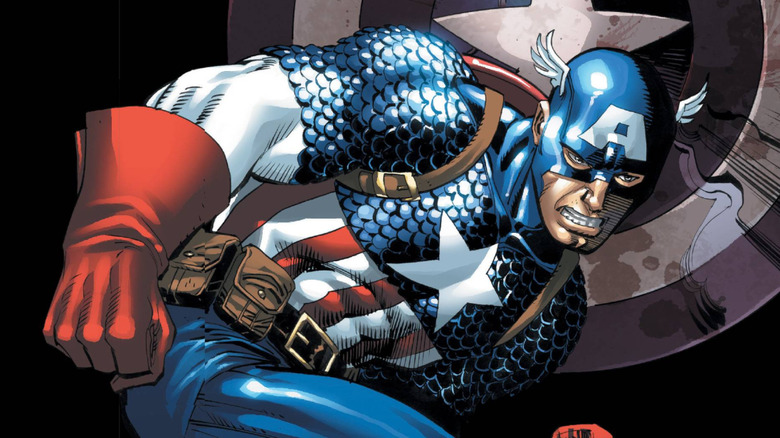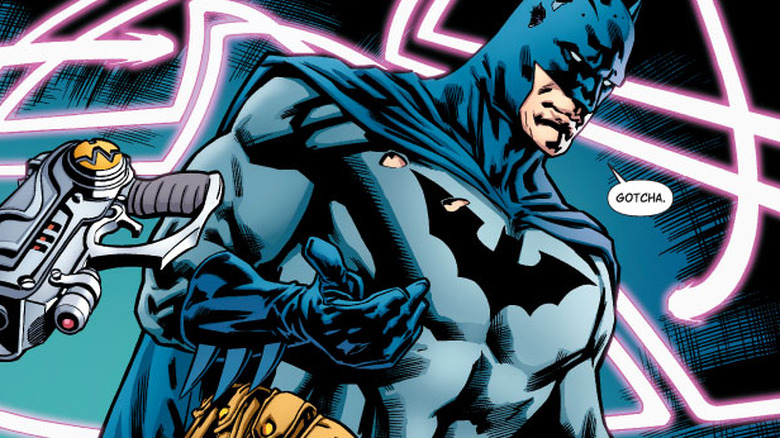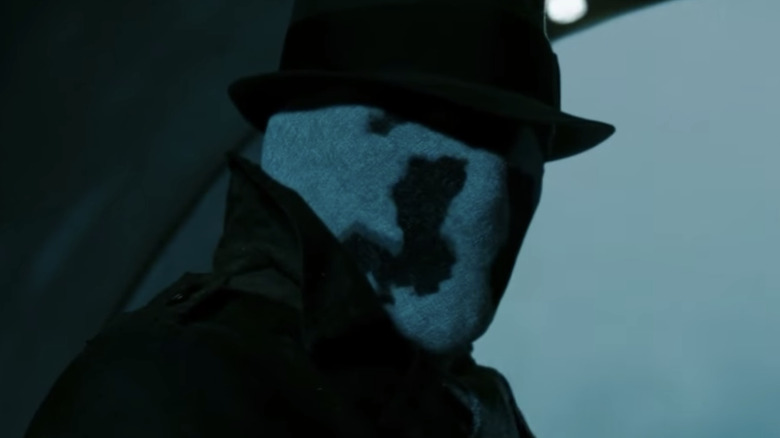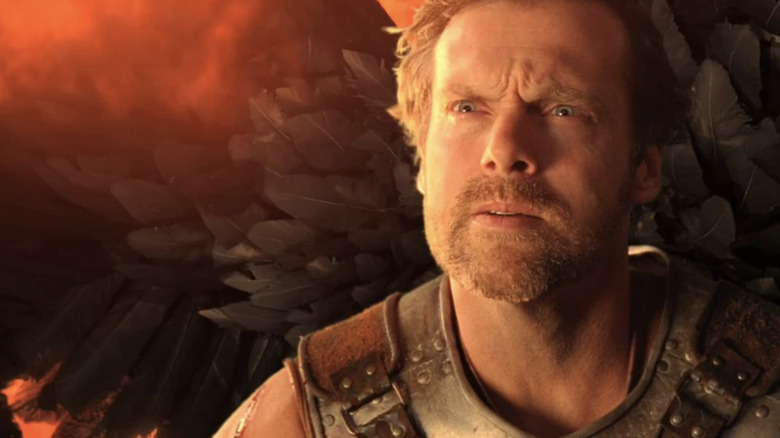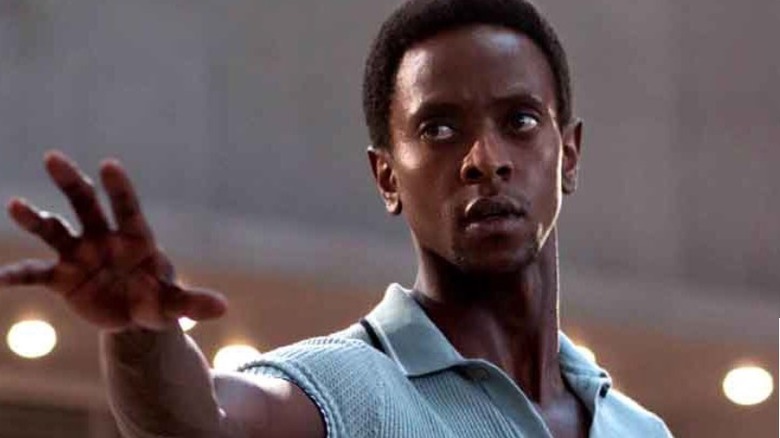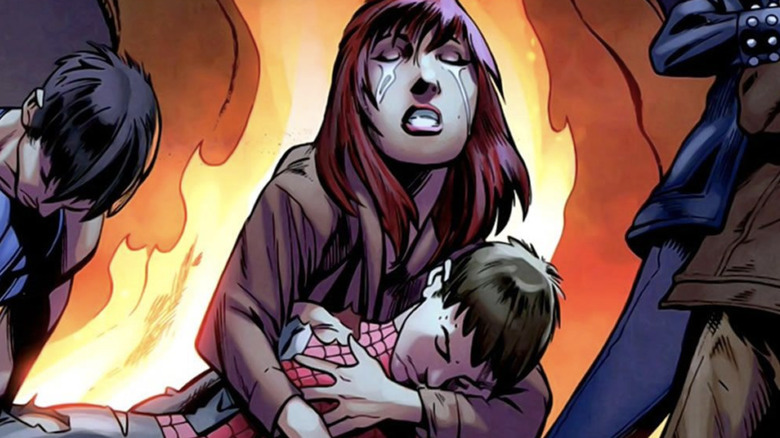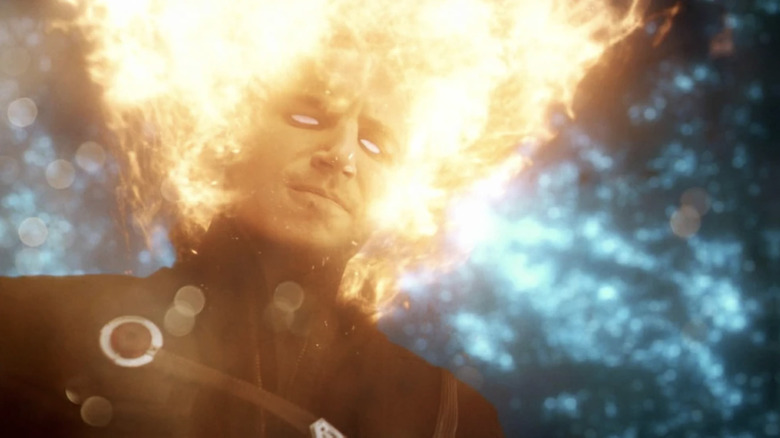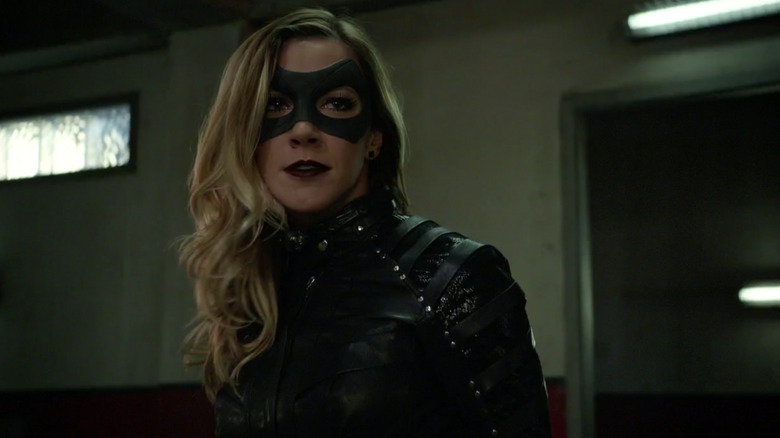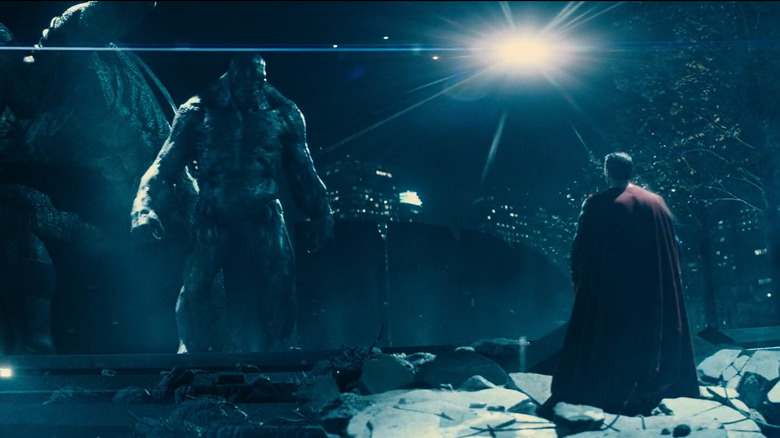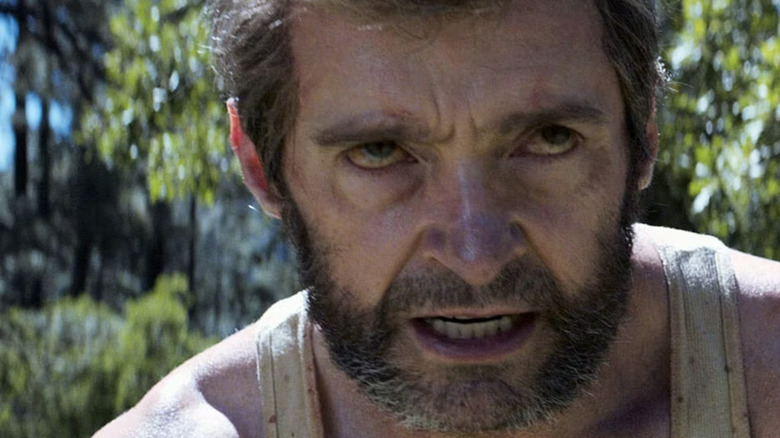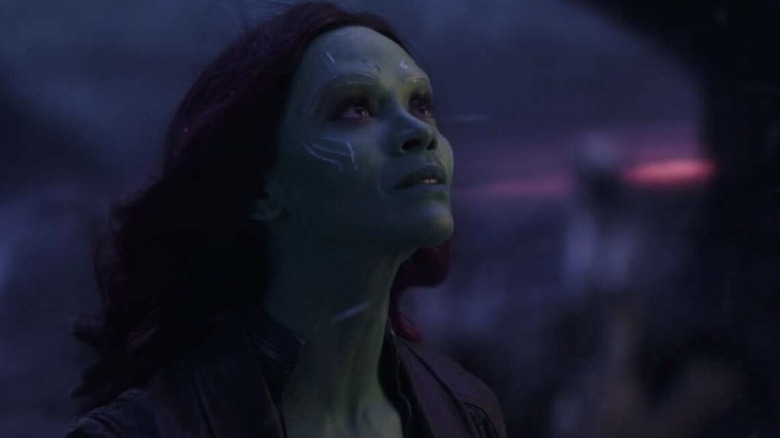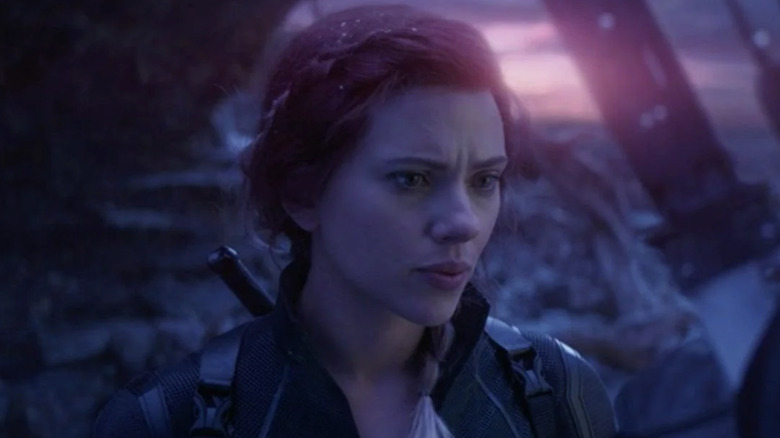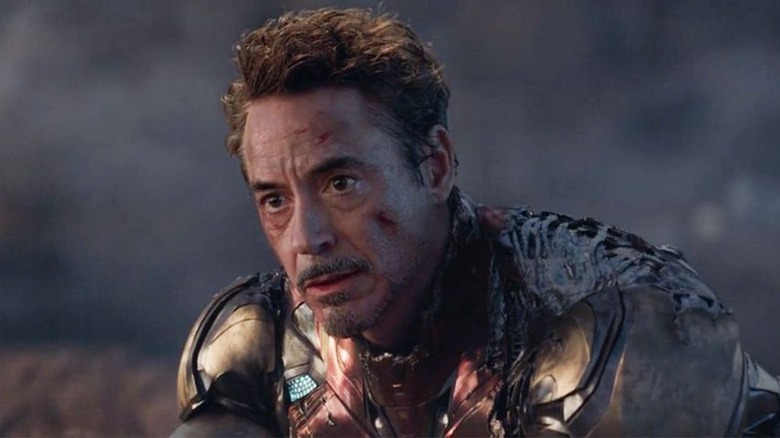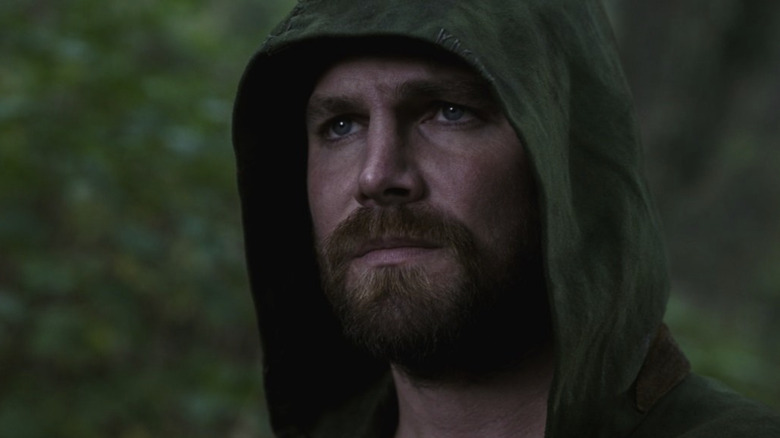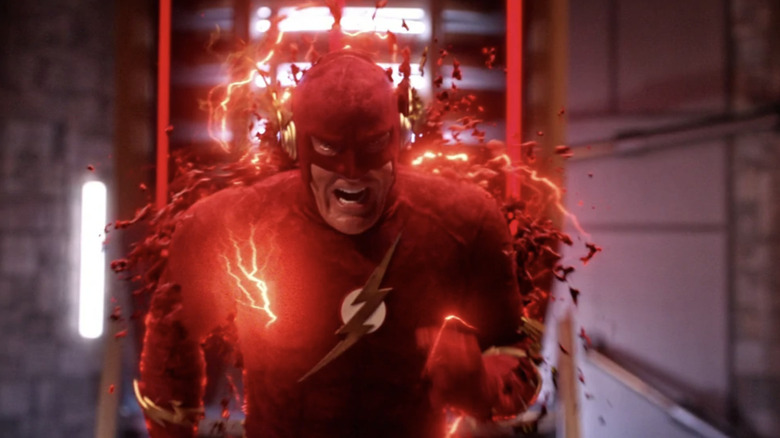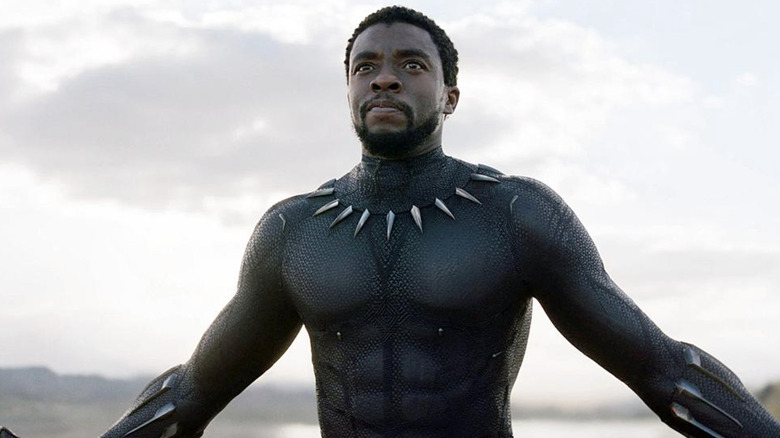The Most Tragic Superhero Deaths Of The 21st Century
Superheroes are some of the most popular fictional characters in this day and age. In a post-9/11 world, everyone's looking for a hero, and with the success of the original "X-Men," "Spider-Man," and "The Dark Knight" films at the turn of the century, there's no denying the cultural impact that these sorts of characters can have. Originating in the pages of comic books, superheroes have found new life in film and television, with stories being told for all sorts of audiences across various mediums, and we couldn't be happier.
Of all the comic book publishers out there, DC Comics and Marvel Comics reign supreme. With heroes like Batman, Superman, Spider-Man, and the Avengers at their disposal, they tell some of the most iconic, challenging, and heart-wrenching stories out there. Everyone loves a hero, which makes it all the harder to watch them die despite their often meaningful and heroic deaths. Speaking of, death and superheroes have a unique history in that, most of the time, death is pretty inconsequential in the long run anyway.
With the advent of more and more comic book adaptations in film and television, superhero deaths have arguably more of an impact now than ever. While we couldn't possibly list them all here, these are some of the most tragic superhero deaths of the 21st century from across film, television, and, yes, the original comic books that inspired them.
Blue Beetle (Countdown to Infinite Crisis)
In 2005, there was a lot of hype leading up to the critically acclaimed "Infinite Crisis." As the DC Comics event was meant to be a long-awaited sequel to the beloved "Crisis on Infinite Earths," there was certainly a lot that the Geoff Johns penned series had to live up to. In the one-shot "Countdown to Infinite Crisis," Johns and company set the stage for the massive intercompany crossover, centering on a story led by often-forgotten Justice League member Blue Beetle.
Not to be confused with his successor, Ted Kord doesn't have superpowers and instead builds his own equipment, not unlike Batman. But after Kord loses his fortune, he tracks the theft down to Checkmate's base in Switzerland, where he is confronted by his one-time ally Maxwell Lord. Lord, who had previously worked with Kord as a member of the Justice League International, offers the hero a chance to join him in his mission to wipe metahumans and superheroes off the map, which Kord declines. Unwilling to let Kord walk free, Lord shoots Blue Beetle in the head, killing him instantly.
Unlike most comic book heroes, Ted Kord remained dead for a long time, with Jaime Reyes taking the mantle of Blue Beetle from the fallen hero, honoring his legacy in the DC Universe. Though Kord's alive and well now following a company-wide reboot, his brutal death was beyond shocking at the time with major ramifications.
Cyclops and Jean Grey (X-Men: The Last Stand)
After two incredibly successful "X-Men" films, director Bryan Singer bowed out of the third installment in favor of "Superman Returns" and took actor James Marsden with him. The results were pretty disastrous for "X-Men: The Last Stand," and as such the famed X-Man himself, Scott Summers (Marsden), was essentially written out of the movie. After Jean Grey (Famke Janssen) resurrects as the Phoenix following her demise at the end of "X2," she pulls Scott into a seductive embrace and kills him off-screen.
While Cyclops had been a main cast member for the previous two features and the field leader of the team, he doesn't even suit up in "The Last Stand." Following his death, Wolverine (Hugh Jackman) and Storm (Halle Berry) take over leadership duties as they battle against the villainous Jean Grey, the love of Logan's life. To stop her from killing all humans and mutants alike, Wolverine is forced to kill Jean in a shot that mimicked her second comic book death a few years prior. Needless to say, Scott and Jean end up together in the end, just 6 feet underground.
After Wolverine helps change the timeline in Singer's return to the series, "X-Men: Days of Future Past," Scott and Jean appear alive again in the revised timeline, as the events of "The Last Stand" never happened. While there was still a "Dark Phoenix" story in this timeline, Scott and Jean seemingly make it out alive.
Superboy (Infinite Crisis)
By the time "Infinite Crisis" began, the entire DC Universe was in flux. Much like the first "Crisis" event, this limited series rocked the world of DC Comics and served to rewrite the timeline once more, restoring old origins and worlds. But along the way, the villainous Superboy-Prime hoped to wipe out the universe. Thankfully, Superboy, the clone of both Superman and Lex Luthor who goes by the name Kon-El aka Connor Kent, arrives just in time to save the day.
Although Superboy-Prime was an evil version of a teenage Clark Kent, the modern-day Superboy stands up to his mentor's doppelganger, though it doesn't go as well as he hoped. As a host of heroes — including two Supermen, Batman, Wonder Woman, and their proteges – arrive too late to save Superboy, the Boy of Steel dies of his injuries after fending off Prime from destroying the world. Though Superboy doesn't stop the tyrant, he gives the other heroes the final push they need to save the universes.
Superboy would remain dead for the longest time in the DC timeline, though he'd be resurrected only three years later in the real world. After his death, Connor's body was placed in a holding chamber for 1,000 years before it would be resurrected in the futuristic world of the Legion of Superheroes. Afterward, he'd return to the present and continue his superheroics. No doubt, Connor's death was one of the most tragic and was felt throughout the DC world.
Captain America (The Death of Captain America)
At the end of Marvel's "Civil War" — the comic book, not the movie — Captain America surrenders to SHIELD to end the conflict between superheroes. Hoping to make amends with Iron Man and keep his fellow resistors out of prison, he believed that the only way to truly end this conflict was by giving himself up. As he's taken into custody, Cap is assassinated on the steps of the courthouse by Crossbones under the orders of the Red Skull, but it turns out that there was a conspiracy afoot.
After the death of Steve Rogers, his former partner and reformed assassin Bucky Barnes picked up the shield, working alongside the Avengers and Cap's modern-day sidekick Falcon to discover the truth behind Steve's assassination. Years later, in Ed Brubaker's follow-up, "Captain America: Reborn," the entire truth would be revealed that the Red Skull had brainwashed SHIELD agent and Cap's lover Sharon Carter into shooting him on the steps, sending his consciousness forward and backward throughout time.
Eventually, like most deceased comic book heroes, Steve was restored and eventually reclaimed the mantle of Captain America as Bucky returned to his role as the Winter Soldier, but his death was especially tragic at the time given the War on Terror climate of 2007. No doubt, the Marvel Universe wasn't the same without Captain America, and while others may don the shield for a while, Steve Rogers perfectly embodies the role.
Batman (Final Crisis)
Speaking of heroes who died only to find themselves scattered through time, writer Grant Morrison killed off the Dark Knight himself in the 2009 event series "Final Crisis." Meant to be the end of the "Crisis" trilogy, "Final Crisis" saw Darkseid fight to claim ownership over the DC Universe, even extending his reach beyond just one world. Leading up to "Final Crisis," Morrison had penned the "Batman R.I.P." story arc, which deconstructed the hero's vast comic book history and nearly killed him in the process. However, Batman's actual death would occur in "Final Crisis" after he mortally wounded Darkseid.
Batman's comic book death was shocking to all who witnessed it, and the build-up towards it was impressive. Following Wayne's demise, his first protege Nightwing adopts the cape and cowl as his own and carries on his mentor's legacy for nearly two years. Of course, Batman wouldn't stay dead, but this shocking conclusion that saw the end of the Dark Knight rippled throughout the comic book and real worlds alike.
As it turns out, after Darkseid had used his omega beams on Batman, the Dark Knight was sent through the DCU timeline as he slowly regained his memories of his life as Bruce Wayne. This is chronicled in Morrison's limited series "Batman: The Return of Bruce Wayne," which eventually restores our hero to his rightful place in Gotham, prompting him to set up and establish Batmen across the globe in "Batman Incorporated." The world needs Batman after all!
Rorschach (Watchmen)
Whenever a direct comic book adaptation is brought to the screen, chances are that we already know how it's going to end. But even if we know what's coming, if done right, the ending can still be just as shocking. This is certainly true with Zack Snyder's adaptation of the iconic graphic novel "Watchmen." Though longtime fans of the Alan Moore story knew how the film would end, they played the scene so well that you can't help but feel it.
After it's revealed that the Watchmen's longtime ally Ozymandias (Matthew Goode) was behind a nuclear attack on the world's biggest cities, framing Doctor Manhattan (Billy Crudup) in the process, the former team decides that the only way to keep world peace is to let the world believe Manhattan was responsible. Well, except for Rorschach (Jackie Earle Haley), who believes that the world has a right to know. "Never compromise, not even in the face of Armageddon." That's what he says to his oldest friend, Nite Owl (Patrick Wilson), before he walks out to meet his explosive fate.
Confronted by Doctor Manhattan, Rorschach defends the truth rather than plead for his own life, leaving the godlike being with seemingly no other choice. As he blows Rorschach away, Nite Owl screams at the loss of his friend and his conscience. Though Rorschach dies, his words remain as the end of "Watchmen" reveals that his journal, containing information about Ozymandias' plan, was leaked to the press — and the truth lives on.
Hawkman (Smallville)
Though "Smallville" was a series about a young Clark Kent (Tom Welling) on the road to becoming Superman, he managed to meet plenty of other superheroes along the way. In fact, the longer "Smallville" was on the air, the deeper into the world of DC Comics the show plunged, introducing Clark to heroes like Green Arrow (Justin Hartley) and Aquaman (Alan Ritchson) years before they donned spandex. But not every hero would make it through the series' end to establish the Justice League.
In the episode aptly titled "Icarus," the villain Darkseid uses his influence on the people of Metropolis to change their perception of vigilantes. This includes the U.S. Army Gen. Slade Wilson (Michael Hogan), who makes it his sworn duty to detain and destroy the world's greatest heroes. After Lois Lane (Erica Durance) uncovers his plan, he threatens her life, but not before she could be saved by Hawkman (Michael Shanks), who comes to her aid at the eleventh hour. As Hawkman battles Slade, a gas explosion blows out the room, forcing Hawkman to save Lois before she's consumed by flames.
While he manages to get Clark's fiance out safely, it's at the cost of his own life. As Carter dies in his friend's arms, he embraces his next adventure and is hopeful that he'll be reunited with his wife in their next life. The episode ends on a somber note with the Leaguers burying their colleague as his sacrifice is honored by all.
Darwin (X-Men: First Class)
No superhero's death has been the topic of such fiery debate as was Darwin's death in 2011's "X-Men: First Class." A mutant with an ability called "reactive evolution," Darwin (Edi Gathegi) embodies his namesake by being able to survive just about anything. In the comics, Darwin is a strange, almost alien-like mutant who has been around since the early 21st century, though in the film — much like fellow mutants Beast (Nicholas Hoult) and Mystique (Jennifer Lawrence) — he looks mostly human.
Upon an attack from Sebastian Shaw (Kevin Bacon) and his Hellfire Club, the newly formed X-Men are faced with a choice: join Shaw and turn their backs on everything they stand for or stand with Professor X (James McAvoy) and Magneto (Michael Fassbender). Well, aside for one of them, the X-Men make the right choice, though Darwin and Alex Summers (Lucas Till) attempt to trick Shaw, which results in Darwin's death. Unfortunately, the highly-adaptable mutant wasn't able to adapt to the energy burst in his body.
"I thought that was a huge miss, killing Darwin," Gathegi said about his time on the "X-Men" prequel (via Comicbook.com), "and I think Darwin does deserve redemption." Most fans agree, and with all the potential of an unkillable mutant (not unlike Wolverine in some ways), "X-Men: First Class" fails to use him in any creative capacity whatsoever. No doubt, the word "tragic" doesn't even begin to cover it.
Spider-Man (Ultimate Spider-Man & Amazing Spider-Man)
It's one thing to kill off a superhero in a comic book, chances are they'll come back at some point, but it's another to kill off that same hero twice in the span of two years. That's right, in case you forgot, Marvel Comics killed off Peter Parker aka Spider-Man on two separate occasions, first in the "Ultimate Spider-Man" series written by Brian Michael Bendis in June 2011 and second in the main continuity in Dan Slott's "Amazing Spider-Man" run in December 2012, just after Christmas.
For over a decade, the modern, teenage reinterpretation of Peter Parker reigned in "Ultimate Spider-Man," a highly acclaimed series that often flipped the Spider-Man mythos on its head. However, in "The Death of Spider-Man" arc, Peter manages to save his Aunt May from the Green Goblin in a battle that costs him his life. While this paved the way for Miles Morales, it was no less a blow to see this version of Spidey go — at least for a few years.
We were likewise heartbroken when the mainstream Peter Parker was killed off in the "Dying Wish" arc, which ended with a dying Doctor Octopus switching bodies with Spider-Man, though he didn't count on experiencing all of Peter's traumatic memories as a result. As Peter lay dying, Doc Ock took on the mantle of "Superior Spider-Man" and vowed to honor Peter's legacy. Though Peter would eventually return, "Amazing Spider-Man" #700 was certainly a tough one to get through.
Firestorm (The Flash)
When Firestorm, the Nuclear Man, was introduced in the very first season of "The Flash," fans were excited at the possibilities of introducing other superpowered heroes to the Arrowverse. At the time, only the Flash (Grant Gustin) himself and a few others had any special abilities, and from there the universe only expanded further. As characters Ronnie Raymond (Robbie Amell) and Dr. Martin Stein (Victor Garber) merged into the conjoined transmuted being called Firestorm, they were able to use their powers to aid their friends and save the universe from destruction.
After having just gotten married to Dr. Caitlin Snow (Danielle Panabaker), Robbie is forced to merge with Stein once again in order to help the Flash save Central City from a singularity. Tragically, this costs Robbie his life, and while he saves Stein — who carries on the Firestorm name with newcomer Jefferson "Jax" Jackson (Franz Drameh) — and the rest of the world, he and Caitlin never make it to their honeymoon. Years later, an alternate version known as Deathstorm would arrive claiming to be Robbie, but the real Firestorm was dead.
Though other characters throughout the Arrowverse would meet their ends — including Martin Stein, who sacrifices himself for Jax, thus ending Firestorm forever — none are as heartbreaking as Robbie's, who never got that "happily ever after" with his wife. It's a tough one to watch unfold, for sure, but that's often what being a hero means, making the ultimate sacrifice.
Black Canary (Arrow)
After years of implying that Oliver Queen (Stephen Amell) and Dinah Laurel Lance (Katie Cassidy) were meant to be together by the show's end, "Arrow" threw us a curveball and killed off Laurel in the show's fourth season episode "Eleven-Fifty-Nine" after she stood up against the season's big bad Damien Darhk (Neal McDonough). After her sister's death the year prior, Laurel had taken up the identity of Black Canary in her memory. Working her way toward becoming a hero, Laurel laid down her very life for her home.
It's worth noting that this was the time during the show's run when fans were debating whether Oliver should end up with Laurel like in the DC Comics or with newcomer Felicity Smoak (Emily Bett Rickards), so Laurel's death sort of settled the debate. In fact, her death only further pushed Team Arrow to defeat Darhk and reclaim their city. It was a bit of a bummer though, given all that Laurel had persevered through previously, and was a death that was certainly met with some criticism.
While Laurel remained 6 feet under, her Earth-2 doppelganger eventually made her way to Star City, where she reformed from her criminal ways and joined Team Arrow, honoring Laurel's sacrifice and legacy. Even when Oliver was given supernatural power and had the opportunity to rewrite reality, which allowed him to resurrect many of his loved ones, he kept Laurel's sacrifice intact. Nice one, Ollie.
Superman (Batman v Superman: Dawn of Justice)
Of all the movies in the DC Extended Universe, none were more controversial among audiences at the time of release than "Batman v Superman: Dawn of Justice." Whether you loved Zack Snyder's attempts to merge multiple comic book storylines together or you hated the conflict between the World's Finest duo, there's no doubt that Superman's (Henry Cavill) ultimate sacrifice was both unexpected and pretty hard to watch. After making amends with Batman (Ben Affleck), the Man of Steel worked alongside the Caped Crusader and newcomer Wonder Woman (Gal Gadot) to battle the Kryptonian abomination Doomsday.
As this trinity of heroes battled Lex Luthor's (Jesse Eisenberg) brainless monster, Batman uses his kryptonite-infused weaponry to slow it down and Wonder Woman held the creature at bay. This gave Superman the chance to use Batman's kryptonite-pointed spear to pierce its heart — though, sadly, Doomsday also impaled Superman in the struggle, killing the Man of Steel also. As Batman and Wonder Woman retrieved his body, Lois Lane (Amy Adams) holds his lifeless corpse, which is incredibly hard to stomach once we learn that Clark was about to propose.
Of course, Henry Cavill's Superman is later resurrected in both versions of "Justice League" to help the titular heroes against Darkseid's forces — but had "Batman v Superman" been the end to Snyder's canon, it would've finished on a truly sour note. Thankfully, just like in the comics, Superman returns from the dead just in the nick of time.
Wolverine (Logan)
For a while, Hugh Jackman's Wolverine and Patrick Stewart's Professor X were the longest-running superheroes in live-action media, having played the characters for nearly 20 years. James Mangold's "Logan" put an end to all that — well, until more recent MCU outings — officially concluding the "X-Men" canon with a Western-inspired finale that is so powerful that fans revisit it often. Like most Wolverine stories, this one isn't for the faint of heart, but it's still an incredible tale with an ending we can't quite get over.
After taking his biological daughter Laura (Dafne Keen) across the border into Canada, losing his own surrogate father along the way, Logan is forced to fight for Laura and her friends as a group of Reavers arrive to take them into captivity. Using the last of his strength, Logan fends off a younger clone of himself before Laura delivers the final blow. As the last X-Man dies in his daughter's arms, he tearfully reminds her that she doesn't have to be who they made her.
In case you're heartless, this end of an era brought plenty of folks to tears by the time the Johnny Cash-infused credits rolled as Jackman's then-final performance as Wolverine pushed him to his absolute limits. Though a variant of Wolverine appeared in "Deadpool and Wolverine," for many, his story truly ended in "Logan."
Everyone in Avengers: Infinity War
To mention everyone who died in "Avengers: Infinity War" would take a lot longer than we have time for here, but there are a few characters whose deaths have been a bit more permanent since they weren't restored in "Avengers: Endgame." Among them are the reformed Loki (Tom Hiddleston), the android Vision (Paul Bettany), and the Guardians of the Galaxy member Gamora (Zoe Saldaña) who was sacrificed by her father Thanos (Josh Brolin) for an Infinity Stone.
In the battle against Thanos, both Loki and Vision sacrificed themselves to save Thor (Chris Hemsworth), Wanda Maximoff aka Scarlet Witch (Elizabeth Olsen), and the universe from the Mad Titan's schemes. While their deaths are tough to watch, especially after everything these characters had gone through, it is Gamora's death that's the most tragic. After she and Star-Lord aka Peter Quill (Chris Pratt) had finally commenced their relationship, Thanos took that all away in a moment that seemed just as painful for him as it was for us.
Though everyone who died in "Infinity War" has made their way back to the MCU in some capacity since — yes, including variants of Loki, Vision, and Gamora — these well-developed versions of these characters haven't been seen since. In fact, neither Star-Lord nor Scarlet Witch have gotten over their lovers' deaths, with the latter not handling it well at all. At least Thor seems to be getting along somewhat okay.
Black Widow (Avengers: Endgame)
Although most of the deaths in "Avengers: Infinity War" were undone by "Endgame's" end, those who met their demise in the fourth "Avengers" flick weren't so lucky. Before the world was even saved, and before she got her own solo movie, Black Widow (Scarlett Johansson) gave her life for the salvation of the universe. As all her friends and family were restored, poor Natasha never got to reunite with those she loved most in the world, even after years of fighting the good fight.
As Black Widow and Hawkeye (Jeremy Renner) are sent to Vormir, the Red Skull (Ross Marquand) reveals that only one of them will make it out of there. As Thanos was forced to sacrifice Gamora, one of the Avengers must give up their life. As Natasha and Clint battle it out to decide who will sacrifice themselves, Black Widow comes out on top, pinning Hawkeye to the cliff as she goes over. With her death, the Avengers are able to reunite the Infinity Stones and reverse Thanos' original snap, restoring the world.
While Black Widow's first solo film was released after her death, serving as a bridge between "Infinity War" and "Endgame," the character's death has been more final. While her sacrifice has been overshadowed by that of Iron Man's (Robert Downey Jr.), it has still made an impact on the MCU, particularly in the Disney+ limited series "Hawkeye."
Iron Man (Avengers: Endgame)
As the one who started it all, Robert Downey Jr.'s Iron Man is easily the most recognizable face in the Marvel Cinematic Universe. Beginning with 2008's "Iron Man," Downey played Tony Stark for over a decade before "Avengers: Endgame," appearing not only in his own solo trilogy, but also in each "Avengers" film and installments of the "Captain America" and "Spider-Man: Home" trilogies, leaving his mark on the MCU in more ways than one.
After "Infinity War," Iron Man, like everyone else, was left defeated with little hope for the future. Then he had a daughter (Lexi Rabe), and his family became his sole priority. So when the Avengers came up with a plan to reverse Thanos' snap, it's no wonder that Stark was leery of messing that all up. However, after the Avengers restored all those who were lost, Thanos arrived to reclaim the Infinity Stones and remake the world in his own image, prompting Stark to make the ultimate sacrifice.
As Iron Man used the Stones to erase Thanos and his forces, they drained the life out of him. Thankfully, most of his loved ones — including his best friend Rhodey (Don Cheadle), Peter Parker (Tom Holland), and his wife Pepper Potts (Gwyneth Paltrow) — were there to see him off. Afterward, a funeral was had for Tony as members of the Avengers, Guardians of the Galaxy, and the Marvel universe mourn his passing. Needless to say, Tony's death led to plenty of tears in the theater.
Green Arrow (Crisis on Infinite Earths)
Speaking of starting a greater universe, while "Iron Man" launched the MCU, the Stephen Amell-led "Arrow" began the CW's DC Comics-inspired Arrowverse in 2012. What started as a grounded attempt to retell the Green Arrow legend became the bedrock for the network's other superhero shows that brought the heroes of DC Comics to life on the small screen. As Oliver Queen developed from a bloodthirsty vigilante to the leader of a group of heroes, he became willing to lay down his life for the sake of the universe.
After a whole season of foreshadowing, Oliver confronts his own mortality in the "Crisis of Infinite Earths" crossover event that united the heroes from "Arrow," "The Flash," "Supergirl," "Batwoman," and "DC's Legends of Tomorrow" with those from other worlds, including "Smallville" and "Superman Returns." To save his friends, Oliver was killed by shadow demons, only to be resurrected later as the Spirit of Vengeance known as the Spectre. As the Spectre, Oliver once again laid his life down to stop the world-killing Anti-Monitor (LaMonica Garrett) and, with his final act of heroism, restored the multiverse.
In the year 2040, Oliver reunites with his wife Felicity in the afterlife, a well-deserved end to such a pivotal character. "In my opinion, the way it should end for any superhero without superpowers is in the ground," Amell said when asked about coming back to the Arrowverse, "Although I think Oliver just turned into energy. So you know, never say never" (via Den of Geek).
The Flash (Crisis on Infinite Earths)
From the very first episode of "The Flash," it was teased that — just like his comic book counterpart — Barry Allen aka the Flash would die in the upcoming Crisis. While this ultimately proved true, it didn't happen the way we all thought it would. Instead of the Grant Gustin Flash meeting his end during the "Crisis on Infinite Earths," the Flash from the short-lived 1990s "The Flash" series, played by John Wesley Shipp, gave up his life for the universe in a scene that perfectly mirrored Barry Allen's comic book demise.
Fans of the original '90s series rejoiced when Shipp returned as the original live-action Barry Allen in the Arrowverse's "Elseworlds" crossover back in 2018, though his return was short-lived. Shipp had previously played Barry's father, Henry Allen, on "The Flash," as well as the Earth-3 variant Jay Garrick aka the original comic book Flash, but his second return as the original Barry Allen was particularly heartbreaking. As Gustin's Barry said goodbye to his best friends, he was about to fulfill his destiny before Shipp's Flash stepped into the anti-matter cannon, which tore him apart.
After years of fear that Barry Allen might die on "The Flash," these fears were ultimately realized in the Earth-90 Flash's demise. But even if it wasn't Gustin's Flash who sacrificed himself, the death of Shipp's Flash was one of the most tear-jerking moments from the highly anticipated five-part mega-crossover.
Black Panther (Black Panther: Wakanda Forever)
If the death of a fictional hero is tragic, then the death of a real-life one is even more so. After the return of Chadwick Boseman's Black Panther in "Avengers: Endgame," fans were ecstatic about the possibility of a follow-up to the highly acclaimed 2018 "Black Panther" film, with Boseman in the title role. Unfortunately, Boseman died of colon cancer in 2020, which drastically changed "Black Panther: Wakanda Forever" before the film even began production.
After Boseman's death, Marvel Studios refused to recast King T'Challa and decided instead to kill off the character by way of a mysterious illness in the sequel. Of course, this happened off-screen and played a huge role in the events of "Wakanda Forever," namely in Shuri's (Letitia Wright) journey toward becoming the new Black Panther in her brother's honor. But that's not the only way that T'Challa's memory was carried on in the sequel, it's also revealed that his love interest Nakia (Lupita Nyong'o) had T'Challa's son (Divine Love Konadu-Sun) during the Blip, whom she'd been raising in secret, a boy whose Wakandan name is T'Challa.
While the original Black Panther may not live on in the MCU, it's reassuring to know that others continue to carry on his name. Although Boseman, and by extension T'Challa himself, may be gone, his legacy lives on throughout the Marvel Cinematic Universe.
